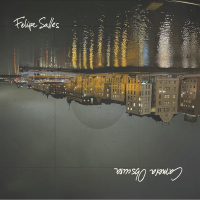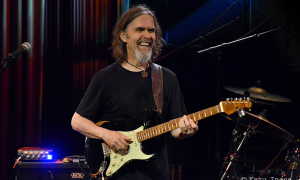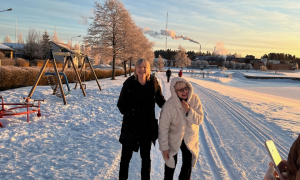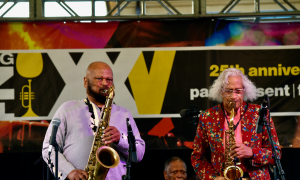Home » Jazz Articles » SoCal Jazz » Douye: At Last, A Sophisticated Lady
Douye: At Last, A Sophisticated Lady

My daddy used to say, 'It takes a lot to be a lot.'
—Douye

Sarah Vaughan
vocals1924 - 1990

Billie Holiday
vocals1915 - 1959

Ella Fitzgerald
vocals1917 - 1996

Douyé
vocalsb.1969
Her story is both heartwarming and remarkable. Douye, now residing in Los Angeles, has followed her path of destiny and embraces every moment. Having now recorded with the likes of

Ron Carter
bassb.1937

Kenny Barron
pianob.1943
All About Jazz: Taking it from the top, what part of Nigeria are you from?
Douye: I was born in Lagos, which used to be the capital. That is now a state called Abuya.
AAJ: Did you start out singing in your church choir?
D: Yes. Well, I actually started singing at home. My Godmother was the musical director of our local church. She started talking to me about being part of the church choir. Eventually I decided to give it a shot. I went there and sang, and the church members were impressed. That's when I started to sing in public. I was only seven years old.
AAJ: Singing then came instinctively to you? It felt natural from the start?
D: Yes, in my recollection I was always singing at home. I knew that it was part of me. The good thing is that my godmother brought me into the church choir as it gave me a safe place to build my confidence and hone my skills as a singer. Singing came as a real natural feel for me. I hear a melody I like, and I start humming it. If I really like it then I learn the words and start singing it. That has always been like that for me.
AAJ: Your father had a lot to do with your musicality and interest in jazz. Tell us about your dad and that very special bond.
D: My dad was a beautiful person and a true father. I grew up in a middle-class family. My father traveled a lot and that opened up opportunities for me to travel to other parts of the world. He loved jazz. He really loved jazz. He would come home with all the newest jazz and would sit me down and we would listen. For a time just listening, but as time went on, he educated me to listen to the words, to listen to the instrumental parts, listen to how they bend the notes and different things like that. Mind you I was very young, just a little girl. He would just look at me and tell me that I was born to do this.
AAJ: He could see then that you were receptive to it.
D: Exactly. Once he realized that this was my calling there was no holding back. He would introduce me to more jazz. All different types of jazz at that point. There was always music playing in the house. All the African jazz, Brazilian jazz, bossa nova, all types of jazz I was exposed to so that I could have a deep ear as to what to listen for and then find my own sound. It was a very beautiful experience with my father. He gave me a great perspective of a real man and what a real father should be. He passed when I was just eleven years old. He was only with me for eleven years. But with him every day was like Christmas.
AAJ: Wow, what a wonderful thing to say.
D: Of course, if I was wrong about something, he had a way of letting me know. He had a way of schooling me about life. He was a straight shooter and spoke to me with words of wisdom. He didn't fool around, but he also had a very human sensitive side to him. I do miss him so.
AAJ: I'm sure you do. Your dad has had an enormous impact on your career, on your life, remarkably in just eleven years.
D: My entire life, yes. I think it is because he had such a big heart. Also, he was very concerned with social issues. He was concerned about the homeless. He would go out and feed them. My dad was among high-ranking military personnel and he would gather all the people in the neighborhood and feed them. He cared a lot about people. He was a very special man. He schooled me in life as well as in music.
AAJ: It led ultimately to Daddy Said So. An album of elegantly performed standards reminiscent of the golden age of jazz. Let's talk a little about the inspiration behind those song selections and arrangements.
D: I chose all of the songs. These are songs that when I was listening as a child, with my dad, that really touched my heart. "'Round Midnight" was my father's favorite. We would listen to it again and again. (laughing) then he would say let's listen to it again.
AAJ: A classic tune. You had

John Beasley
pianoD: Yes, John lives here in Los Angeles and we have become acquainted. I asked him about doing some arrangements for the record. So pleased that John was on board with that and yes played beautifully on "'Round Midnight."
AAJ: How did you go about getting the likes of Ron Carter, Kenny Barron, and other jazz elites on board with this project?
D: Like so many things it goes back to my dad. He loved

Miles Davis
trumpet1926 - 1991
AAJ: I'll bet. That's pretty exciting!
D: I just couldn't believe it. After working and recording with Kenny Barron, I told him how much I really wanted to work with Ron Carter. Kenny helped with some advice as to how to get it to him. Ron Carter gets the demo, says he likes my voice, and when would you like to record together. Now this time I actually did fall over!! I mean are you kidding me? Ron Carter? THE Ron Carter? Just like that. He had only a small window the next morning then he was going to be out of town. So, I seized the opportunity. It was time to take it and run.
AAJ: What was it like meeting and working with Carter for the first time?
D: After we agreed on the time and the studio and all that I flew to New York to meet with him. I called him as soon as I got into town and he said to meet him at the studio at 10am and to please be on time. I. of course, didn't want to risk being late. I left an hour early and arrived at the studio at 9:08. Mr. Ron Carter was there already! He was tuning his bass and ready to go. I couldn't believe it. It was delightful. I have so much love and respect for this wonderful man. So diligent and focused. As soon as I walked in, he looked at me and smiled. He said, "You know, I tested you and you passed." (Douye laughs out loud). He just opened up after that to do the work with me. It was just beautiful.
AAJ: It had to be magical to record "Nature Boy" as a vocal/bass duet with such an icon in the history of jazz.
D: You know, I thought to myself that if I was going to have this wonderful opportunity to work with this great man, I don't want a trio or whatever like that. I just want him and his instrument. He asked me how I would like him to arrange it. "How many instruments do you hear?," he asked. He was a little surprised when I told him that I just wanted him and his bass. He is such a master of that instrument. I wanted to keep it simple and for him to be featured.
AAJ: Your dad would have been so proud.
D: Oh yes. I could just feel his presence and became teary eyed afterwards. In a good way, you know?
AAJ: I can imagine. It must indeed be special, not just in this moment, but within your jazz career to be fulfilling both your own and your father's dreams.
D: Yes. Very much so. From the time I was ten years old. And to be able to work all these years later with these gentlemen that were so very appreciated by my dad. Yes, it is very special. He told me I was destined to do this. That I was chosen to do this. That the Gods of music will lead your path. I didn't always understand it all when I was just a child. But I sure do now.
AAJ: Going back, what brought you from Nigeria to Los Angeles? And don't say an airplane because you know that's not what I mean.
D: (laughing) Well, I had spent a lot of time in England growing up. I have family there, so ever since I was five or six years old, I was going back and forth between Nigeria and England. My dad loved England. It is maybe a six to seven-hour flight from Nigeria. We used to vacation in England quite a bit. He always wanted to expose me to the western world. He wanted me to observe some of the western ways of thinking and living. I spent about six months a year in England, so I lived in both worlds. My dad was thinking way ahead, because that has shaped who Douye is today. I'm very appreciative of my heritage but I am very western in my thinking. When I was about eighteen, I realized that I needed to come to America and stay if I really wanted to pursue the career in music. I went to a music school to study voice. I went to a school called the Musicians' Institute. After that, through one of my instructors, I met a gentleman named Terry Shaddick. He is the composer of Olivia Newton John's big hit "Physical." He is quite a bit older than me and became a mentor. He is from England and we connected right away with our British ways of having a spot of tea and that sort of thing. He had the kind of wisdom that I saw in my father. A real straight shooter. He took interest in me because he could see that I was eager to do it and do it well. He especially helped me with writing and composing.
AAJ: What are the major cultural differences between living in Nigeria and living in the western world?
D: Nigeria is very very cultured and appreciative of their heritage. The way they dress. The way they eat. They are very respectful of one's elders. The way they socialize in Nigeria is very different from the way the western world socializes. Still, some commonalities with England, as they are very cultured and respectful there as well. I think what my dad was trying to accomplish was the fact that if I was going to be doing western music that he didn't want me to be closed minded. It was important to be exposed to the western thinking. My sound, my style, my thinking, was all shaped by those experiences. Let me give you an example. I love hats. All kinds of hats. I collect them. In England we always wore hats. We still do. Everywhere you go you wear hats. I decided that they would be a good way to define my appearance and my style as a jazz artist. Thinking back to when I was little and listening to the jazz music with my dad, most of the women back then wore hats. It was the style back then in jazz. I admire that. It's not like that now. But I decided that if I was going to do jazz that I wanted to be like the legends back in the day. I like the way they presented themselves and wanted to bring that back. I have some beautiful hats from the 1920s, 1930s, and 1940s.
AAJ: Which vocalists inspired you at an early age?
D: There are four that I still listen to every day.

Frank Sinatra
vocals1915 - 1998
AAJ: Yeah, Billie Holiday really expressed the many feelings and emotions involved in her music.
D: Yes, very much so. I have tried to take elements from all of them in shaping my own sound and style. I listen to others, of course. But I find myself always going back to these four. My ear calls me back for different things. They are my masters. I listen to them every day. It's so amazing that every time I listen that I still hear something different.
AAJ: That's perhaps the most remarkable element of listening to jazz.
D: Yes, I think so too. Sometimes if I am in a bittersweet mood, I can feel every (with emphasis) bit of the emotion that Sarah Vaughn is trying to convey. Then it's just wow, how did she do it? She did it so clean and simple yet truly magical. It just doesn't get any better to me. I have so much respect for those artists. I so wish I could have met them.
AAJ: We can be thankful that they all left us such a large and wonderful volume of work that will live on forever. Let's talk then about your new record, Quatro: Bossa Nova Deluxe. It's a gorgeous record. What led you in the direction of bossa nova?
D: I wanted to do something different. It's doing well on the charts. Daddy Said So was a vocal jazz record of timeless standards. I wanted to do an entire album of something different, not just put in a couple of bossa nova tunes. I was inspired by the many people of African heritage that are now in Brazil. I have been to Brazil and I thought it would be interesting to do a project that mixes the sounds of African jazz with the Brazilian bossa nova. As an artist I wanted to do not only something unique but that also showcases a part of me. The African percussion sounds aren't quiet. There is generally a bounce to them. The Brazilian percussion and rhythms are different. The samba and Latin sounds bring in different elements. It was quite challenging really to infuse all of that. But I'm quite glad that I did.
AAJ: Again, you were joined by a bevy of talented musicians. It is a very strong jazz drenched record instrumentally as well. How did this project all come together?
D: I worked with a gentleman named
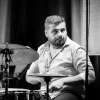
Zack O'Farrill
drumsAAJ: The song selection flows seamlessly. It's a well-chosen collection of compositions including many from

Antonio Carlos Jobim
piano1927 - 1994
D: Yes, these are all my selections and yes, I love Jobim's work and have so much respect for him. I felt like you can't really do bossa nova and not do his music. I gave tribute to him. He is the Godfather of bossa nova.
AAJ: You perform frequently in various clubs in the LA area. Are you looking to take the show on the road?
D: Yes, I am going to get out there a bit. I am going to Florida in July and then the east coast and the Midwest in October. I want to put my name out there and have some fun performing. I always have my musical director and pianist, Aaron Provisor, with me. He knows me and my music so very well. We practice together every week. So, I am very comfortable and confident of always being able to give a strong performance anywhere we play.
AAJ: Well, having seen and heard you perform live a couple of times now, I certainly know that to be true. I admire your work ethic.
D: Thank you very much. My dad used to say, "It takes a lot to be a lot."
AAJ: Oh, I like that quote. I like that a lot.
D: Yeah, it takes a lot to be a lot. It's very true, you know. Artistry is timeless. I want to always be careful to do my best work and make sure that what I create will last a lifetime. You take someone like

John Coltrane
saxophone1926 - 1967
Tags
SoCal Jazz
DouyЁҰ
Jim Worsley
United States
California
Los Angeles
Sarah Vaughn
Billie Holiday
Ella Fitzgerald
Ron Carter
Kenny Barron
John Beasley
Miles Davis
Terry Shaddick
frank sinatra
Zack O'Farrill
Antonio Carlos Jobim
John Coltrane
Comments
PREVIOUS / NEXT
Support All About Jazz
 All About Jazz has been a pillar of jazz since 1995, championing it as an art form and, more importantly, supporting the musicians who make it. Our enduring commitment has made "AAJ" one of the most culturally important websites of its kind, read by hundreds of thousands of fans, musicians and industry figures every month.
All About Jazz has been a pillar of jazz since 1995, championing it as an art form and, more importantly, supporting the musicians who make it. Our enduring commitment has made "AAJ" one of the most culturally important websites of its kind, read by hundreds of thousands of fans, musicians and industry figures every month.
Go Ad Free!
To maintain our platform while developing new means to foster jazz discovery and connectivity, we need your help. You can become a sustaining member for as little as $20 and in return, we'll immediately hide those pesky ads plus provide access to future articles for a full year. This winning combination vastly improves your AAJ experience and allow us to vigorously build on the pioneering work we first started in 1995. So enjoy an ad-free AAJ experience and help us remain a positive beacon for jazz by making a donation today.

Los Angeles
Concert Guide | Venue Guide | Local Businesses
| More...






 Buy Now
Buy Now





